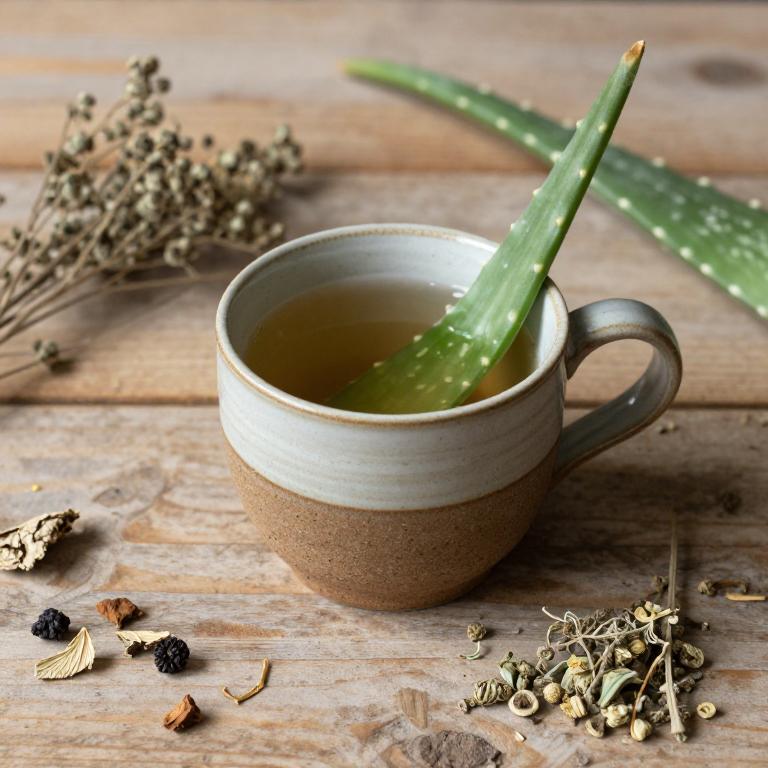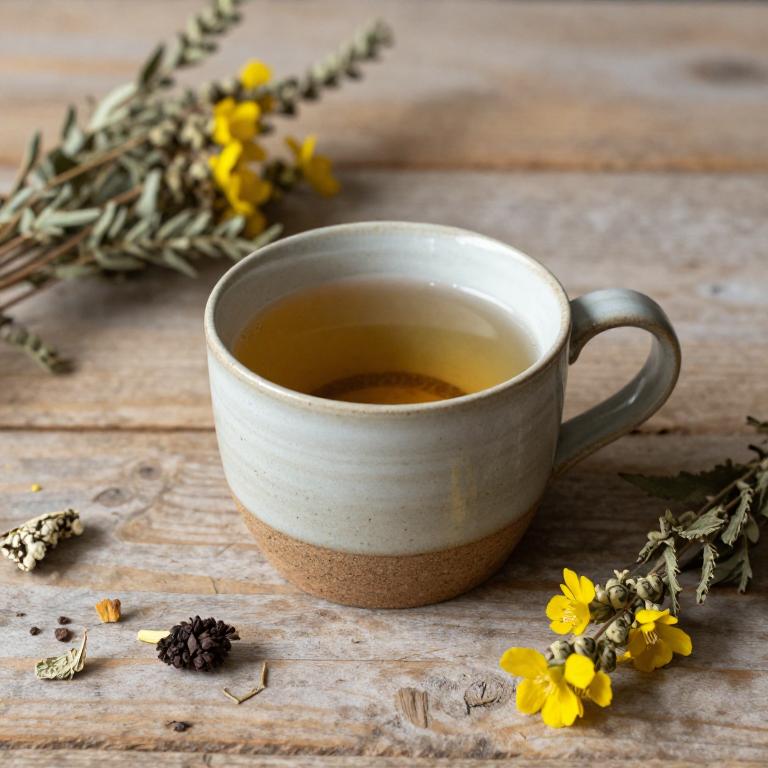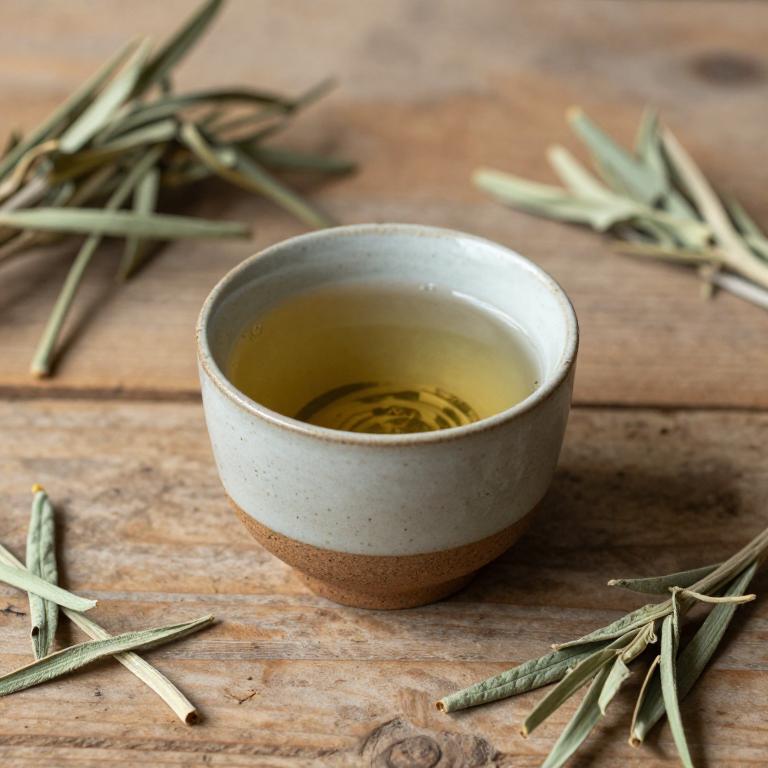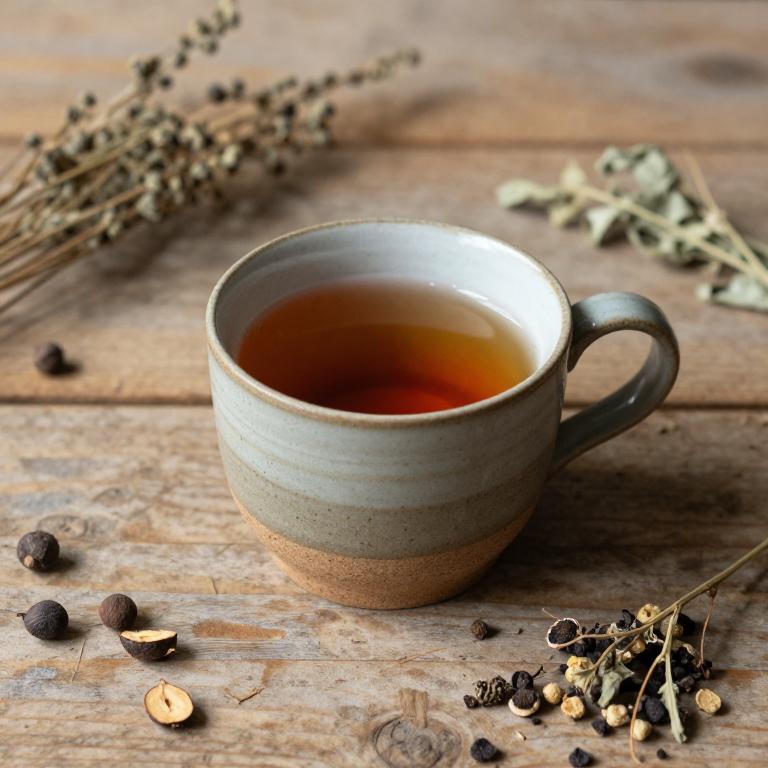10 Best Herbal Teas For Fungal Skin Infection

Herbal teas can be a natural and soothing option for managing fungal skin infections, offering antifungal properties that help reduce symptoms like itching and redness.
Common herbs such as calendula, chamomile, and tea tree oil are often used in herbal teas due to their antimicrobial and anti-inflammatory benefits. These teas can be applied topically as a compress or consumed internally to support the body's immune response against the infection. While they may not replace prescription treatments, they can complement conventional therapies and provide relief for mild cases.
However, it is important to consult a healthcare professional before using herbal teas, especially if the infection is severe or persistent.
Table of Contents
- 1. St. john's wort (Hypericum perforatum)
- 2. Aloe vera (Aloe barbadensis)
- 3. Stinging nettle (Urtica dioica)
- 4. English lavender (Lavandula angustifolia)
- 5. Thistle (Silybum marianum)
- 6. Common teucrium (Teucrium marum)
- 7. Lemon grass (Cymbopogon citratus)
- 8. Ginger (Zingiber officinale)
- 9. Ceylon cinnamon (Cinnamomum zeylanicum)
- 10. Mexican mint (Plectranthus barbatus)
1. St. john's wort (Hypericum perforatum)

Hypericum perforatum, commonly known as St. John's wort, is a herbal remedy traditionally used for its potential antimicrobial properties.
While it is well-known for its use in treating mild depression, recent studies suggest that it may also possess antifungal effects, making it a possible alternative for managing certain fungal skin infections. The active compounds in hypericum perforatum, such as hypericin and hyperforin, are believed to contribute to its antifungal activity by inhibiting fungal cell growth. Herbal teas made from dried hypericum leaves can be consumed internally or applied topically to affected skin areas, though it is important to consult a healthcare professional before use, especially if taking other medications.
Despite its potential benefits, hypericum perforatum may interact with certain drugs and should not be used as a substitute for conventional antifungal treatments without medical guidance.
2. Aloe vera (Aloe barbadensis)

Aloe barbadensis, commonly known as aloe vera, has been widely used in herbal teas for its potential benefits in treating fungal skin infections.
The plant contains various bioactive compounds, including polysaccharides, enzymes, and antioxidants, which may help reduce inflammation and support skin healing. Some studies suggest that aloe vera can inhibit the growth of certain fungi, making it a natural alternative for topical treatments. When consumed as a tea, aloe vera may also support the body's immune system, enhancing its ability to fight off infections.
However, it is important to consult a healthcare professional before using aloe barbadensis tea for fungal infections, as it may interact with certain medications or cause gastrointestinal side effects in some individuals.
3. Stinging nettle (Urtica dioica)

Urtica dioica, commonly known as stinging nettle, has been traditionally used in herbal medicine for its anti-inflammatory and antimicrobial properties.
When prepared as a tea, it may help support the body's natural defenses against fungal skin infections by reducing inflammation and promoting skin healing. The tea contains compounds such as flavonoids and alkaloids that have been shown to exhibit antifungal activity in preliminary studies. While it is not a substitute for conventional antifungal treatments, some individuals use urtica dioica tea as a complementary therapy to alleviate symptoms.
However, it is important to consult a healthcare professional before using it, especially if you have underlying health conditions or are taking other medications.
4. English lavender (Lavandula angustifolia)

Lavandula angustifolia, commonly known as English lavender, has been traditionally used for its antimicrobial and anti-inflammatory properties, making it a promising ingredient in herbal teas for the treatment of fungal skin infections.
The essential oils in lavender, particularly linalool and lavandulyl acetate, have shown efficacy against various fungi, including Candida and Trichophyton species. When brewed into a tea, lavender can help soothe irritated skin and reduce inflammation associated with fungal infections. However, while lavender tea may offer supportive relief, it should not replace conventional antifungal treatments prescribed by a healthcare professional.
Consistent use of lavender-infused topical applications, combined with proper hygiene, may enhance the overall management of fungal skin conditions.
5. Thistle (Silybum marianum)

Silybum marianum, also known as milk thistle, is a herbal remedy that has been studied for its potential benefits in treating fungal skin infections.
The plant contains compounds such as silymarin, which exhibit antioxidant and anti-inflammatory properties that may help combat fungal growth. While it is not a direct antifungal agent, some research suggests that silymarin can enhance the body's immune response and support skin health. Herbal teas made from silybum marianum are often used as a complementary therapy alongside conventional treatments.
However, it is important to consult a healthcare professional before using this herb, as it may interact with certain medications or not be effective for all types of fungal infections.
6. Common teucrium (Teucrium marum)

Teucrium marum, commonly known as redstem verbena, has been traditionally used in herbal medicine for its potential antifungal properties.
Herbal teas made from Teucrium marum are believed to help alleviate symptoms of fungal skin infections such as athlete's foot and ringworm due to the presence of bioactive compounds like flavonoids and tannins. These compounds may inhibit the growth of fungi by disrupting their cellular structures and reducing inflammation. To prepare the tea, the dried leaves are steeped in hot water for several minutes, and the resulting infusion can be applied topically to the affected area.
While some anecdotal evidence supports its efficacy, more scientific research is needed to fully understand its role in treating fungal infections.
7. Lemon grass (Cymbopogon citratus)

Cymbopogon citratus, commonly known as lemongrass, is a herbal plant that has been traditionally used for its medicinal properties, including its potential to combat fungal skin infections.
The essential oils extracted from lemongrass, particularly citral and geraniol, exhibit antifungal activity by inhibiting the growth of various fungal species. When prepared as a herbal tea, lemongrass can be applied topically to affected areas, offering a natural alternative for those seeking non-chemical treatments. Studies suggest that regular use of lemongrass tea may help reduce symptoms such as itching and redness associated with fungal infections.
However, it is advisable to consult a healthcare professional before using lemongrass as a treatment, especially for severe or persistent infections.
8. Ginger (Zingiber officinale)

Zingiber officinale, commonly known as ginger, has been traditionally used in herbal teas to support skin health and combat fungal infections due to its potent antimicrobial and anti-inflammatory properties.
The active compounds in ginger, such as gingerol and shogaol, exhibit antifungal effects by inhibiting the growth of dermatophytes and other fungal pathogens that cause conditions like athlete's foot and ringworm. When consumed as a herbal tea, ginger can enhance the body's immune response and promote detoxification, which indirectly aids in the treatment of fungal skin infections. However, while ginger tea may provide supportive benefits, it should not replace conventional antifungal treatments recommended by healthcare professionals.
For best results, ginger tea can be used as a complementary therapy alongside medical treatments to improve overall skin health and recovery.
9. Ceylon cinnamon (Cinnamomum zeylanicum)

Cinnamomum zeylanicum, commonly known as Ceylon cinnamon, has been traditionally used in herbal medicine for its antimicrobial and antifungal properties.
When brewed into a herbal tea, it may help alleviate symptoms of fungal skin infections such as athlete's foot or ringworm due to its ability to inhibit the growth of fungi. The active compounds in cinnamon, including cinnamaldehyde and eugenol, contribute to its antifungal effects by disrupting fungal cell membranes. However, while some preliminary studies suggest its potential benefits, more clinical research is needed to confirm its efficacy and safety for treating fungal infections.
As with any herbal remedy, it is advisable to consult a healthcare professional before using Ceylon cinnamon tea as a treatment for skin conditions.
10. Mexican mint (Plectranthus barbatus)

Plectranthus barbatus, commonly known as Greek mint, has been traditionally used for its antifungal properties and is increasingly being explored as a natural remedy for fungal skin infections.
The plant contains essential oils rich in compounds like thymol and carvacrol, which exhibit potent antifungal activities against various dermatophytes and yeast species. Herbal teas made from Plectranthus barbatus can be applied topically or consumed internally to support the body's immune response against fungal infections. While preliminary studies show promising results, more clinical research is needed to confirm its efficacy and safety for widespread use.
As an alternative or complementary therapy, Plectranthus barbatus herbal tea may offer a natural option for managing mild to moderate fungal skin conditions.